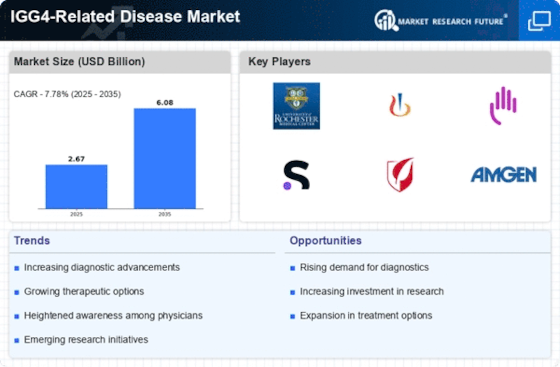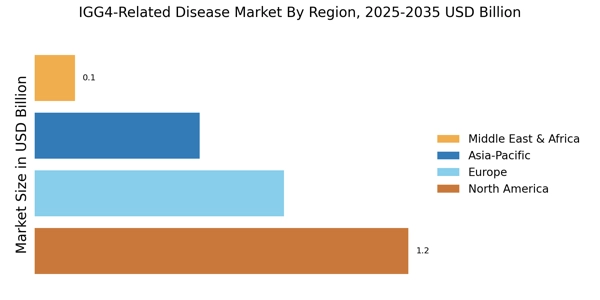Growing Research Initiatives
The increase in research initiatives focused on IGG4-Related Disease is a critical driver for the IGG4-Related Disease Market. Numerous academic and clinical research institutions are dedicating resources to better understand the pathophysiology of this disease. This surge in research is expected to yield new insights into disease mechanisms, which may lead to the development of novel diagnostic and therapeutic strategies. Funding from government and private sectors is also on the rise, with millions allocated annually to support studies aimed at improving patient care. As research progresses, it is anticipated that new findings will translate into clinical applications, further stimulating market growth. The commitment to advancing knowledge in this area underscores the importance of research in shaping the future of the IGG4-Related Disease Market.
Emerging Therapeutic Innovations
Innovations in therapeutic options are transforming the IGG4-Related Disease Market. Recent advancements in biologics and targeted therapies have shown promise in managing this complex condition. For instance, monoclonal antibodies that target specific pathways involved in the disease process are being developed, potentially offering more effective treatment alternatives. The market for these innovative therapies is projected to grow, with estimates indicating a compound annual growth rate of over 10% in the next five years. This surge in therapeutic innovations not only enhances patient outcomes but also attracts investment from pharmaceutical companies eager to capitalize on the expanding market. As new treatments emerge, the landscape of the IGG4-Related Disease Market is likely to evolve, providing patients with more options and improving overall care.
Increased Healthcare Expenditure
The rise in healthcare expenditure across various regions is significantly impacting the IGG4-Related Disease Market. As healthcare budgets expand, there is a greater allocation of funds towards rare diseases, including IGG4-Related Disease. This increase in spending facilitates the development of advanced diagnostic tools and treatment modalities, which are essential for managing this condition effectively. Reports indicate that healthcare spending is projected to grow by approximately 5% annually, creating a favorable environment for market expansion. Additionally, increased funding for healthcare initiatives may lead to improved access to care for patients, thereby enhancing diagnosis and treatment rates. Consequently, the upward trend in healthcare expenditure is likely to play a pivotal role in shaping the IGG4-Related Disease Market.
Rising Patient Advocacy and Support Groups
The emergence of patient advocacy and support groups is becoming a vital driver in the IGG4-Related Disease Market. These organizations play a crucial role in raising awareness about the disease, providing education, and supporting patients and their families. As these groups gain traction, they are likely to influence public perception and encourage more individuals to seek diagnosis and treatment. Furthermore, advocacy efforts can lead to increased funding for research and development, as well as improved access to care. The presence of strong advocacy networks may also prompt pharmaceutical companies to prioritize the development of therapies for IGG4-Related Disease, recognizing the demand from informed patients. Thus, the rise of patient advocacy and support groups is expected to significantly impact the IGG4-Related Disease Market.
Increasing Incidence of IGG4-Related Disease
The rising incidence of IGG4-Related Disease is a notable driver in the IGG4-Related Disease Market. Recent studies indicate that the prevalence of this condition is increasing, with estimates suggesting that it affects approximately 1 in 100,000 individuals. This growing number of diagnosed cases is likely to drive demand for diagnostic tools and treatment options, thereby expanding the market. As healthcare providers become more aware of the disease, the number of patients seeking treatment is expected to rise. This trend may lead to increased investments in research and development, as pharmaceutical companies aim to address the unmet needs of this patient population. Consequently, the increasing incidence of IGG4-Related Disease is poised to significantly influence the market landscape in the coming years.

















